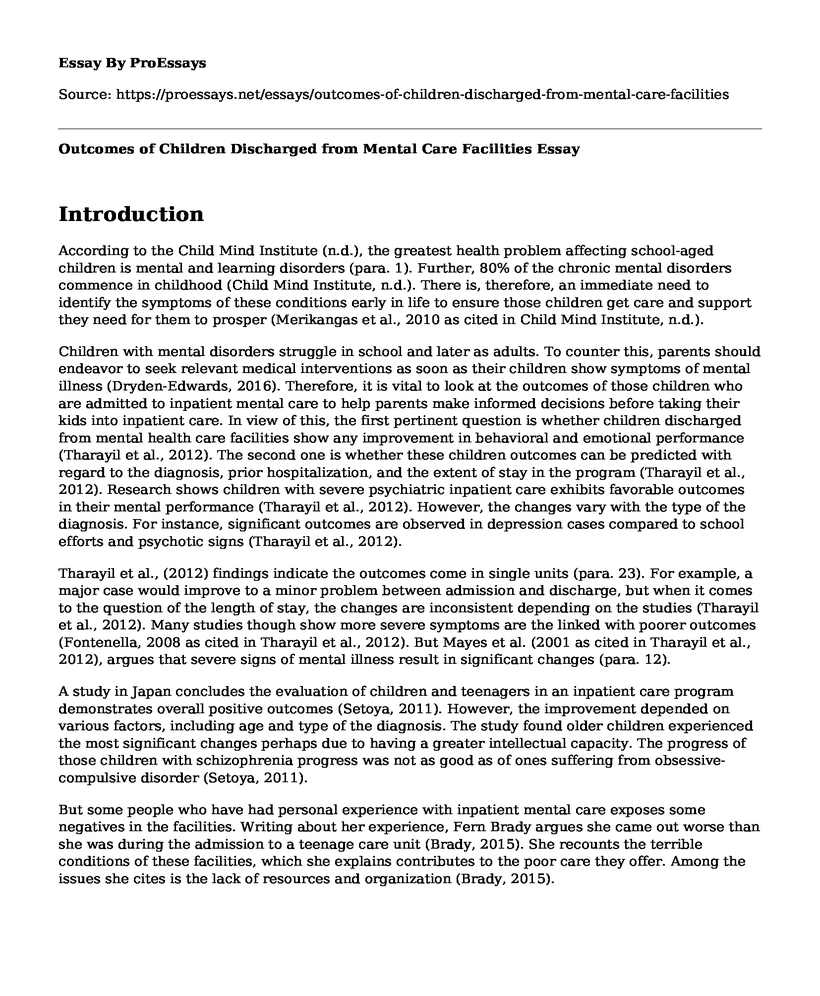Introduction
According to the Child Mind Institute (n.d.), the greatest health problem affecting school-aged children is mental and learning disorders (para. 1). Further, 80% of the chronic mental disorders commence in childhood (Child Mind Institute, n.d.). There is, therefore, an immediate need to identify the symptoms of these conditions early in life to ensure those children get care and support they need for them to prosper (Merikangas et al., 2010 as cited in Child Mind Institute, n.d.).
Children with mental disorders struggle in school and later as adults. To counter this, parents should endeavor to seek relevant medical interventions as soon as their children show symptoms of mental illness (Dryden-Edwards, 2016). Therefore, it is vital to look at the outcomes of those children who are admitted to inpatient mental care to help parents make informed decisions before taking their kids into inpatient care. In view of this, the first pertinent question is whether children discharged from mental health care facilities show any improvement in behavioral and emotional performance (Tharayil et al., 2012). The second one is whether these children outcomes can be predicted with regard to the diagnosis, prior hospitalization, and the extent of stay in the program (Tharayil et al., 2012). Research shows children with severe psychiatric inpatient care exhibits favorable outcomes in their mental performance (Tharayil et al., 2012). However, the changes vary with the type of the diagnosis. For instance, significant outcomes are observed in depression cases compared to school efforts and psychotic signs (Tharayil et al., 2012).
Tharayil et al., (2012) findings indicate the outcomes come in single units (para. 23). For example, a major case would improve to a minor problem between admission and discharge, but when it comes to the question of the length of stay, the changes are inconsistent depending on the studies (Tharayil et al., 2012). Many studies though show more severe symptoms are the linked with poorer outcomes (Fontenella, 2008 as cited in Tharayil et al., 2012). But Mayes et al. (2001 as cited in Tharayil et al., 2012), argues that severe signs of mental illness result in significant changes (para. 12).
A study in Japan concludes the evaluation of children and teenagers in an inpatient care program demonstrates overall positive outcomes (Setoya, 2011). However, the improvement depended on various factors, including age and type of the diagnosis. The study found older children experienced the most significant changes perhaps due to having a greater intellectual capacity. The progress of those children with schizophrenia progress was not as good as of ones suffering from obsessive-compulsive disorder (Setoya, 2011).
But some people who have had personal experience with inpatient mental care exposes some negatives in the facilities. Writing about her experience, Fern Brady argues she came out worse than she was during the admission to a teenage care unit (Brady, 2015). She recounts the terrible conditions of these facilities, which she explains contributes to the poor care they offer. Among the issues she cites is the lack of resources and organization (Brady, 2015).
Conclusion
The issue of child mental disorder is one of the greatest healthcare challenges the world faces. Early detection of symptoms associated with mental illness is vital to allow children to get appropriate care and support. One way of intervention is admission to mental care facilities. Overall, children that are put in proper inpatient care experience better outcomes. However, the results vary depending on many factors. These include age, type of the diagnosis, and whether or not the services received are of good quality.
References
Brady, F. (2015, July 14). I came out of a teenage mental health unit worse than when I went in. Retrieved from https://www.theguardian.com/commentisfree/2015/jul/14/teenage-mental-health-unit-camhs-sitcom-comedy
Child Mind Institute. (n.d.). 2016 children's mental health report. Retrieved from https://childmind.org/report/2016-childrens-mental-health-report/
Dryden-Edwards, R. (2016, August 23). Mental illness in children: Signs, types, & causes. Retrieved from https://www.medicinenet.com/mental_illness_in_children/article.htm#mental_illness_in_children_facts
Setoya, Y., Saito, K., Kasahara, M., Watanabe, K., Kodaira, M., & Usami, M. (2011). Evaluating outcomes of the child and adolescent psychiatric unit: A prospective study. International Journal of Mental Health Systems, 5(1), 7. doi:10.1186/1752-4458-5-7
Tharayil, P. R., James, S., Morgan, R., & Freeman, K. (2012). Examining outcomes of acute psychiatric hospitalization among children. Social Work in Mental Health, 10(3), 205-232. doi:10.1080/15332985.2011.628602
Cite this page
Outcomes of Children Discharged from Mental Care Facilities. (2022, Jun 27). Retrieved from https://proessays.net/essays/outcomes-of-children-discharged-from-mental-care-facilities
If you are the original author of this essay and no longer wish to have it published on the ProEssays website, please click below to request its removal:
- Argumentative Essay: Homeschool vs. Public School
- Reflections on Classroom Blogging Paper Example
- Essay Sample on Depression, Panic and Job Loss: Sources of Struggles Beyond Boundary Problems
- Autobiography Study
- Essay on Co-Curricular Activities: Boosting Academic Performance & More
- Diagnosing Autism Spectrum Disorder: Clinical Lengths - Essay Sample
- Admission Essay Sample on Helping People, Saving Lives: My Dream Journey from Russia to the USA







